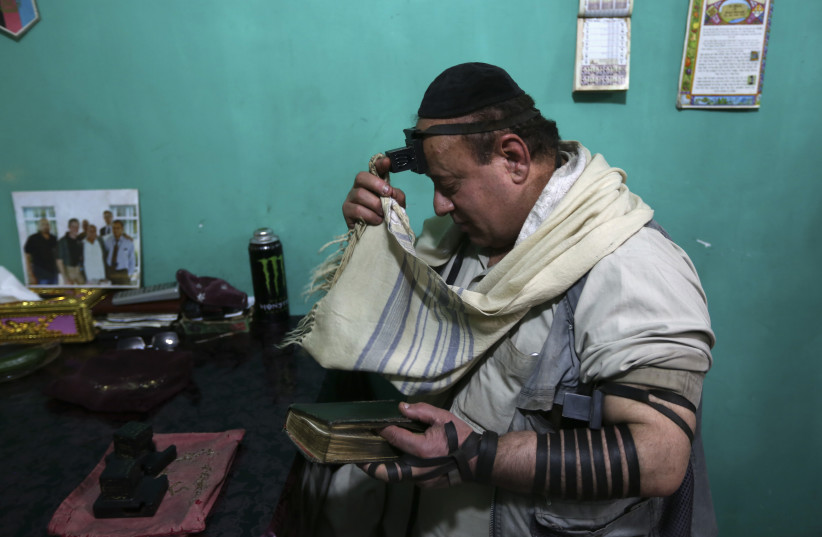The man widely recognized as the last Jew in Afghanistan has been revealed to have only been one of the last Afghan Jews when a distant Jewish relative of his made Aliyah two weeks ago.
Afghanistan, once home to a nearly 50,000-strong Jewish community, bid farewell to its last Jewish inhabitant, Zebulon Simantov, in September.
Simantov was famously the last remaining Jew in the country ever since the other remaining Jew – who notably feuded with Simantov in a story that was eventually adapted into a British play – passed away in 2005. Referred to locally as simply “The Jew,” Simantov had grown into something of an international celebrity, happily granting foreign reporters interviews, and was known universally by members of the community – including Taliban officials.
It now appears that the fanfare may have been misplaced.
A woman named Tova Moradi, 83, fled Kabul with her 20-odd grandchildren last month in an escape orchestrated by humanitarian organization IsraAid. Born to a Jewish family of ten children in Kabul, she ran away from home at age 16 and married a Muslim man.
While the local Jewish community disavowed her, she never converted to Islam, maintained some Jewish traditions, and was known around her neighborhood as Jewish.
“She never denied her Judaism, she just got married in order to save her life as you cannot be safe as a young girl in Afghanistan,” Moradi’s daughter, Khorshid, told the Associated Press.
Moradi noted that her parents and brother fled Afghanistan in the 1960s and 1980s. Many of her surviving brothers and their descendants live in Israel– her parents are even buried in Jerusalem’s Har Menuchot cemetery. Until this week, however, she had not spoken to some of her siblings in over half a century.
“Yesterday, I saw my sisters, nieces and nephews after around 60 years through a video call. We spoke for hours,” Moradi said. “I was really happy, I saw their children and they met mine.”
"It’s like she came back from the grave," Khorshid said.
Moradi had to flee Afghanistan under tense circumstances, as the country’s government fell at the hands of a resurgent Taliban last August. Moradi and her family were among the various cavalries fleeing impending Taliban rule, which included women's rights groups, Afghan informants and translators, the then-government’s military soldiers, and even President Ashraf Ghani.
“I loved my country, loved it very much, but had to leave because my children were in danger,” Moradi told The Associated Press. Moradi has been stationed in a makeshift camp for Afghan refugees in Albania since she was rescued, though arrangements are being made for her to visit Israel, where most of her family lives, and eventually settle in Canada, where her children reside. “We still need for them to reach their final destination,” IsraAid CEO Yotam Polizer said. “We’re worried that they’ll be stuck in limbo.”
Potentially the truly last Jewish resident of Afghanistan, Moradi is actually a distant cousin of the self-proclaimed “Last Jew of Afghanistan,” Zebulon Simantov. While not originally a target of the regime, she harbored Yitzhak Levi –one of Afghanistan’s remaining Jews in the 21st Century– during the Taliban’s initial reign from 1996-2001, going as far as to tell authorities he was a Muslim and making plans to help Levi escape Afghanistan.
Yitzhak Levi was famous for feuding with the other “Last Jew of Afghanistan,” Zebulon Simantov. The two known remaining Jews in Afghanistan shared the country’s last remaining synagogue as their domicile, but quickly grew to hate each other. They held separate prayer services, had vicious shouting matches neighbors could hear from a block away, and would be quick to point the finger at each other when valuable Judaica would go missing.

Simantov told SFGate in 2007 that the feud began when Jewish elders told him to help Levi – more than 20 years his senior –make an “aliyah” and immigrate to Israel. Levi would not budge, accusing Simantov of wanting to sell the synagogue for profit, which Simantov promptly accused Levi of doing himself.
Simantov and Levy, who both prayed daily and kept kosher, continued to fight until the latter’s death in 2005. In 1998, Levi wrote to the Taliban interior minister, accusing Simantov of theft of Jewish relics. Simantov retorted by telling the Taliban that Levi ran a secret brothel where he sold alcohol, which Levi denies. Simantov also spread rumors that Levi had converted to Islam, which Levi denied as well.
“I don’t talk to him, he’s the devil… a dog is better than him … I don’t have many complaints about the Taliban, but I have a lot of complaints about him,” Simantov told The New York Times in 2002. They also denounced each other to the Taliban as spies for Israel's Mossad intelligence agency, prompting Taliban police to beat them and eventually throw them in jail – though they were eventually kicked out when they continued to fight inside the prison.
The feud was so intense that when Levi passed away (much to Simantov’s joy), Afghan police suspected Simantov of murdering Levi himself, until a post-mortem examination showed diabetes was the ultimate cause of death. Simantov and Levi’s relationship was ultimately captured in the 2006 British dark-comedy play “My Brother’s Keeper.”
As the old saying goes: “Two Jews, three opinions”. While perhaps not the “Last Jew in Afghanistan” in title, Moradi is very possibly the last Afghan of Jewish descent to be in the country, and perhaps the last to leave. Regardless, the once-vibrant Jewish communities of Kabul and Herat, Afghanistan, are no more. All that remains is the synagogue, and while its ownership is disputed, what is very much not under dispute is that the synagogue may not host another Jew for centuries.
